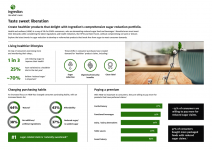Health Canada review could see saccharin ban revoked
reopened its evaluation of the ban on saccharin, the artificial
sweetener linked to bladder cancer.
According to a report in the Regina Leader-Post, Health Canada has been prompted to review its 30-year ban on the sweetener after new studies and information have raised questions about its reported carcinogenic nature.
"We're in the process of reviewing that information to see if we should allow it or keep it banned or change its regulatory status," Health Canada spokesperson, Paul Duchesne is quoted as saying.
Saccharin, once the only commercially significant high intensity sweetener, has seen its market share in the US continue to diminish, although it is reported to retain a significant presence in oral care products and tabletop sweeteners, according to research firm The Freedonia Group.
Prices for this product are said to be relatively stable around the $3/lb mark.
The sweetener, most famously associated with the Sweet 'N Low brand of sweetener, has been banned in Canada since 1977 when animal studies reported an increased risk of bladder cancer.
Indeed, saccharin is only available in Canada from pharmacies, and must be labeled to state it can be "injurious to health."
Pregnant women are advised not to consume the sweetener.
The sweetener is approved for use in foods, however, in the US and numerous other countries, and only last July the FDA published an article in Consumer Magazine stating there are no safety issues with any of the five approved five artificial sweeteners regulated as food additives.
These are aspartame, saccharin, acesulfame-K, neotame and sucralose.
About 180 million American adults currently consuming low-calorie and sugar-free foods and beverages.
The news of the Health Canada review has been welcomed by the Calorie Control Council, a US-based industry group for the low-calorie and reduced-fat goods industry that has been petitioning Health Canada for about five years.
The council's president, Lyn O'Brien Nabors is quoted by the Leader-Post as saying: "We're just delighted.
We really think it's a very safe product.
They're giving serious consideration to reapproving saccharin in Canada."
"There's no reason for it not to be used," she said.
However, consumer groups have voiced concerns over the news with the Center for Science in the Public Interest (CSPI) particularly vocal against the possibility that the sweetener could be approved for use in food.
Michael Jacobson, executive director of the CSPI in Washington, D.C. told the Leader-Post that, while some doubt remains about the sweetener, it would not make sense to approve its use.
Moreover, an earlier review by Canada's Health Protection Branch in 2002 was met with a letter from the Canadian Association of Physicians for the Environment who stated that: "It would be highly imprudent for Health Canada to deny the carcinogenicity of saccharin on the basis of current evidence.
Doing so would give the public a false sense of security, remove any incentive for further testing, and result in greater exposure to this possible carcinogen by millions of Canadians, including children (indeed, fetuses).
If saccharin is even a weak carcinogen, this unnecessary additive would pose an intolerable risk to the public."
( The International Journal of Occupational and Environmental Health, Volume 8, pp 387-393, 2002).




















